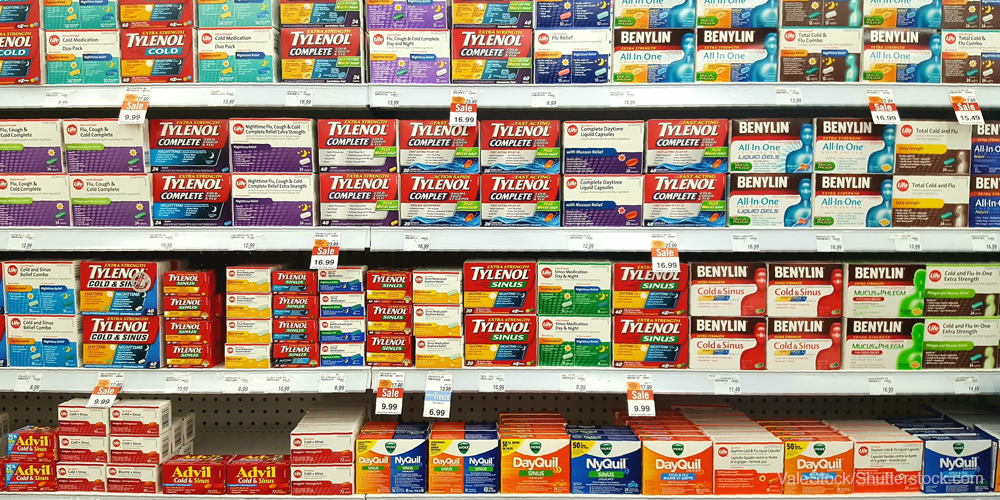OTC Medications
Published (updated: ).

ACHES, PAINS, AND HEADACHES
Over-the-counter pain medicines can help with headache, arthritis pain, sprains, and other minor joint and muscle problems.
- Acetaminophen — Try this medicine first for your pain. DO NOT take more than 3 grams (3,000 mg) on any one day. Large amounts can harm your liver. Remember that 3 grams is about the same as 6 extra-strength pills or 9 regular pills.
- Nonsteroidal anti-inflammatory drugs (NSAIDs) — You can buy some NSAIDs, such as ibuprofen and naproxen, without a prescription.
Both of these medicines can have serious side effects if you take them in high doses or for a long time.
FEVER
Acetaminophen (Tylenol) and ibuprofen (Advil, Motrin) help reduce fever in children and adults.
- Take acetaminophen every 4 to 6 hours.
- Take ibuprofen every 6 to 8 hours. DO NOT use ibuprofen in children younger than 6 months.
- Know how much you or your child weighs before giving these medicines.
Aspirin works very well for treating fever in adults.
COLD, SORE THROAT, COUGH
Cold medicines can treat symptoms to make you feel better, but they do not shorten a cold. Taking zinc supplements within 24 hours of the start of a cold may reduce the symptoms and duration of a cold.
Cough medicines:
- Guaifenesin — Helps break up mucus. Drink lots of fluids if you take this medicine.
- Menthol throat lozenges — Soothes “tickle” in the throat (Halls, Robitussin, and Vicks).
- Liquid cough medicines with dextromethorphan — Suppresses the urge to cough (Benylin, Delsym, Robitussin DM, Simply Cough, Vicks 44, and store brands).
Decongestants:
- Decongestants help clear a runny nose and relieve postnasal drip.
- Decongestant nasal sprays may work more quickly, but they can have a rebound effect if you use them for more than 3 to 5 days. Your symptoms may get worse if you keep using these sprays.
- Check with your provider before taking decongestants if you have high blood pressure or prostate problems.
- Oral decongestants — Pseudoephedrine (Contac Non-Drowsy, Sudafed, and store brands); phenylephrine (Sudafed PE and store brands).
- Decongestant nasal sprays — Oxymetazoline (Afrin, Neo-Synephrine Nighttime, Sinex Spray); phenylephrine (Neo-Synephrine, Sinex Capsules).
Sore throat medicines:
- Sprays to numb pain — Dyclonine (Cepacol); phenol (Chloraseptic).
- Painkillers — Acetaminophen (Tylenol), ibuprofen (Advil, Motrin), naproxen (Aleve).
- Hard candies that coat throat — Sucking on candy or throat lozenges can be soothing. Be careful in young children because of the choking risk.
ALLERGIES
Antihistamine pills and liquids work well for treating allergy symptoms.
- Antihistamines that may cause sleepiness — Diphenhydramine (Benadryl); chlorpheniramine (Chlor-Trimeton); brompheniramine (Dimetapp), or clemastine (Tavist)
- Antihistamines that cause little or no sleepiness — Loratadine (Alavert, Claritin, Dimetapp ND); fexofenadine (Allegra); cetirizine (Zyrtec)
You can also try:
- Eye drops — Soothe or moisten the eyes
- Preventive nasal spray — Cromolyn sodium (Nasalcrom), fluticasone (Flonase)
STOMACH UPSET
Medicines for diarrhea:
- Antidiarrhea medicines such as loperamide (Imodium) — These medicines slow down action of intestine and reduce number of bowel movements. Talk to your provider before taking them because they can worsen diarrhea caused by infection.
- Medicines that contain bismuth — May be taken for mild diarrhea (Kaopectate, Pepto-Bismol).
- Rehydration fluids — May be used for moderate and severe diarrhea (Analytes or Pedialyte).
Medicines for nausea and vomiting:
- Liquids and pills for stomach upset — May help with mild nausea and vomiting (Emetrol or Pepto-Bismol)
- Rehydration fluids — May be used to replace fluids from vomiting (Enfalyte or Pedialyte)
- Medicines for motion sickness — Dimenhydrinate (Dramamine); meclizine (Bonine, Antivert, Postafen, and Sea-Legs)
SKIN RASHES AND ITCHING
- Antihistamines taken by mouth — May help with itching or if you have allergies
- Hydrocortisone cream — May help with mild rashes (Cortaid, Cortizone 10)
- Antifungal creams and ointments — May help with diaper rashes and rashes caused by yeast (nystatin, miconazole, clotrimazole, and ketoconazole)
